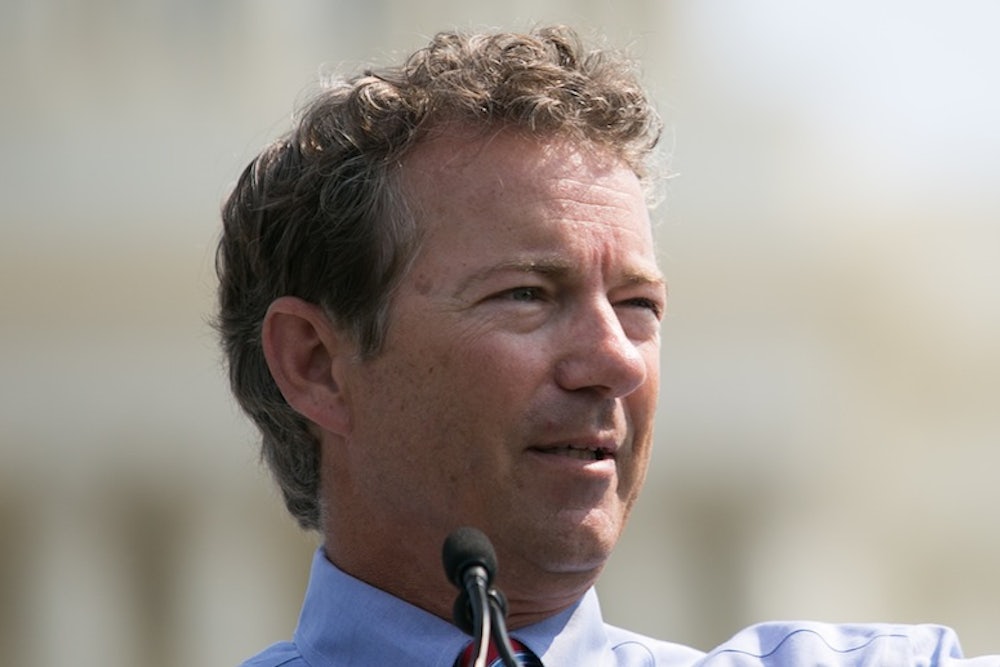Frank Rich has a somewhat surprising essay in New York magazine in which he makes the case that Rand Paul has been an important and valuable presence in the Senate. Rich concedes that Paul would make a dreadful president—"a Paul presidency would be a misfortune for the majority of Americans who would be devastated by his regime of minimalist government"—but he congratulates Paul for enunciating views on foreign policy and civil liberties which are not only sensible, but which are also, in some cases, close to the American mainstream. Additionally, he salutes Paul's push to change mandatory minimum drug sentences, one of those common sense domestic policies that always seems to elude both parties. (The foreign policy equivalent would be Paul's call for a halt in aid to post-coup Egypt, which was greeted with outrage but eventually echoed by John McCain and others).
Rich's piece makes a nice companion to Ross Douthat's interesting op-ed in The New York Times on Sunday. Douthat's argument is essentially that there have been some important policy proposals from Republicans since the 2012 election. There has also been a good dose of lunacy concerning things like Obamacare, the budget, and the debt ceiling. The problem for the GOP, Douthat argues, is that the same people are behind both developments. Mike Lee has proposed tax reform, David Vitter has called for a banking reform bill, and Rand Paul offered the ideas that Rich applauds.
Douthat is understandably harsh on this wing of the GOP because he recognizes that its members are their own worst enemy. As he puts it:
Despite the best efforts of the Lee tax plan's admirers, the party's populists didn’t make headlines last week on that issue. Instead, Lee and Paul were in the news — with the ubiquitous, less innovative junior senator from Texas, Ted Cruz — because they're part of the so-called "defund Obamacare" effort, an elaborate game of make-believe in which Republicans are supposed to pretend, for the sake of political leverage, that they’ll actually shut down the government if the president refuses to go along with the repeal of his own signature legislative achievement...
Hence the widespread view — shared by concerned liberals, chin-stroking moderates, and many Congressional Republicans, I'm sure — that Cruz and Paul and Lee and their compatriots need to be crushed for the Republican Party to become effective and responsible again.
The question therefore arises: is this a coincidence? Is there a reason for this apparent paradox? Here is Douthat's explanation:
The trouble is that if John Boehner and Mitch McConnell could somehow crush the populists (and they can't), they would also be crushing the best hope for conservative policy reform. That's because, for now at least, the same incentives that shape the "bad populism" of the defund movement are also shaping the "good populism" that wants to end farm subsidies or reform drug sentencing or break up banks or cut taxes on families.
Their willingness to engage in theatrical confrontations with President Obama, for instance, is part of what lends figures like Paul and Lee and Vitter the credibility to experiment with ideas from outside the Reagan-era box. And their arm's-length relationship to Wall Street and K Street makes them both more irresponsible on issues like a government shutdown and more open to new ideas on taxes, financial reform, corporate welfare, etc.
This seems correct, but is also not stated strongly enough. No, it isn't a coincidence that these ideas are coming from people with an "arm's-length" relationship to the party's funding base. The explanation is that the GOP's funding base and establishment powerbrokers are intentionally uninterested in creative policy solutions. Douthat and his ilk support things like family-friendly tax reform; most of the Party is actively opposed to any even mildly redistributionist scheme, except those that redistribute wealth upwards. (This isn't a point against Douthat, but it seems pretty clear that the populist reformers themselves don't agree on a lot: It is hard to imagine Paul getting behind Lee's tax proposal, for instance).
Douthat ends his piece by writing:
Obviously Republicans should be seeking a way to have the good without the bad: the innovation without the risky brinkmanship, the fresh ideas without the staged confrontations. But for now, they're stuck dealing with a populism that resembles Homer Simpson's description of his beloved beer: It's both the cause of, and the solution to, all of their problems.
Alas, the Party's real problem is much bigger than this.The real problem is that it's very difficult for ideas to come from within. This is a structural problem which shows no signs of being fixed anytime soon.
